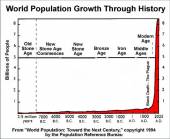The discussion of overpopulation often starts with the ideas of Thomas Malthus (1766-1834). Malthus promoted the concept of “carrying capacity,” the level at which the earth is able to sustain a certain population through adequate food and other natural resources.
“The power of population is so superior to the power of the earth to produce subsistence for man, that premature death must in some shape or other visit the human race. The vices of mankind are active and able ministers of depopulation. They are the precursors in the great army of destruction, and often finish the dreadful work themselves. But should they fail in this war of extermination, sickly seasons, epidemics, pestilence, and plague advance in terrific array, and sweep off their thousands and tens of thousands. Should success be still incomplete, gigantic inevitable famine stalks in the rear, and with one mighty blow levels the population with the food of the world.” —Malthus T.R. 1798. An essay on the principle of population
While human ingenuity, developments in technology, or new channels of resources to exploit may allow a temporary population booms, the fact remains that population will always be ultimately checked by the limited resources available. This process may happen over the course of decades, centuries, or millennia and the shortsightedness of humanity may prevent us from seeing the process clearly. If we look at the graph of human population growth throughout history, there has yet to be any significant check on growth. We might conclude that there is no “limit” to population growth or that, if there is, we haven’t come close to it yet.
The key to understanding the problem of overpopulation is that resources can be exploited at a much faster rate than they can be renewed. If we exploit all the soil, fish, animals, fresh water, forests, and petroleum at as high a rate as we can, we may see a boom in population over the course of a couple thousand years, as these resources continue to support us and we discover more “efficient” ways to use and extract them. However, there will come a point at which the supply of these resources begins to outstrip demand. Some of them may begin to collapse altogether. This is where we are headed and an overwhelming amount of scientific evidence shows that all the natural resources and systems of our home planet, which we have carelessly used and wasted and destroyed, are in decline or collapse. It is not difficult to understand that our population may be soon to follow.
